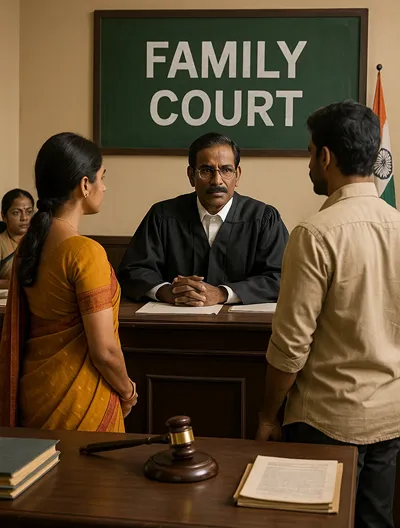
The Family Courts Act, 1984 was enacted to create special courts for quick and sensitive handling of family matters like marriage, divorce, child custody, and maintenance. These courts are designed to promote settlement over conflict, ensuring privacy and emotional support for families instead of a harsh courtroom environment.
Key Features
- Exclusive Jurisdiction: Only family-related disputes—marriage, divorce, maintenance, custody, and family property issues.
- Faster Resolution: Simplified process compared to regular civil courts.
- Mediation First: Courts encourage reconciliation or mediation before passing orders.
- Private Hearings: Proceedings are held in camera (not open to the public).
- Trained Judges: Presiding officers have experience in family law and counselling.
- Lawyers Optional: The court can allow or discourage lawyers to keep the process simple.
How to File a Case in Family Court
| Step | Process | Details |
|---|---|---|
| 1 | Identify Jurisdiction | File where marriage took place or where either spouse resides. |
| 2 | Prepare Petition | Mention facts and relief sought (e.g., divorce, custody, maintenance). |
| 3 | Attach Documents | See below for the required list. |
| 4 | Submit in Family Court Registry | Either in person or through an advocate (if permitted). |
| 5 | Mediation / Counselling | Court first attempts to settle. |
| 6 | Trial & Judgement | If no settlement, the court proceeds with evidence and gives a verdict. |
Documents Required (Depending on Case Type)
| Type of Case | Common Documents |
|---|---|
| Divorce / Separation | Marriage certificate, ID proof, photos, address proof, details of children (if any). |
| Child Custody | Child's birth certificate, proof of care/expenses, school documents. |
| Maintenance / Alimony | Income proof, bank statements, expenses list, marriage proof. |
| Property Disputes | Ownership documents, sale deed, proof of contribution. |
State-wise Family Court Details
| State / UT | Approx. Family Courts | Official Source |
|---|---|---|
| Delhi | 7 Family Courts | districts.ecourts.gov.in/delhi |
| Maharashtra | 26 Family Courts | districts.ecourts.gov.in/maharashtra |
| Uttar Pradesh | 75 Family Courts (one per district) | districts.ecourts.gov.in/uttar-pradesh |
| Tamil Nadu | 16 Family Courts | districts.ecourts.gov.in/tamilnadu |
| Karnataka | 30+ Family Courts | districts.ecourts.gov.in/karnataka |
| Gujarat | 21 Family Courts | districts.ecourts.gov.in/gujarat |
| West Bengal | 23 Family Courts | districts.ecourts.gov.in/west-bengal |
(Check your district court website for exact address and case filing section.)
Family Courts Act – FAQs
-
1. What is a Family Court?
-
A special court handling only family matters like marriage, divorce, child custody, and maintenance.
-
2. Why were Family Courts created?
-
To make family dispute resolution faster, private, and emotionally sensitive.
-
3. Can I file a divorce case here?
-
Yes, Family Courts handle all divorce and separation petitions.
-
4. Are lawyers allowed?
-
They can be, but courts often encourage parties to speak directly.
-
5. Can I file for child custody here?
-
Yes. Custody decisions depend on the child's welfare, not gender.
-
6. Is mediation mandatory?
-
Yes, the court first attempts reconciliation or settlement through mediation.
-
7. Are hearings open to the public?
-
No, proceedings are private to protect family dignity.
-
8. Can women file for maintenance?
-
Yes, women can seek maintenance for themselves and children.
-
9. Can husbands claim custody or maintenance?
-
Yes, based on facts and fairness; gender doesn't decide rights.
-
10. How long does a case take?
-
Simple cases can finish within 6–12 months if both cooperate.
-
11. Where can I check case status?
-
Visit your state's district court website (for example, ecourts.gov.in).
-
12. Can Family Court orders be appealed?
-
Yes, appeals go to the High Court.
-
13. Is counselling free?
-
Yes, courts often have counsellors or mediation centres free of cost.
-
14. What if both parties agree to separate?
-
You can file a joint petition for mutual consent divorce—simpler and faster.
-
15. Can grandparents or guardians file cases?
-
Yes, for child custody or guardianship matters.
Where to Apply
You can file or track cases at your district's Family Court via 👉 https://ecourts.gov.in/ecourts_home/
Add new comment